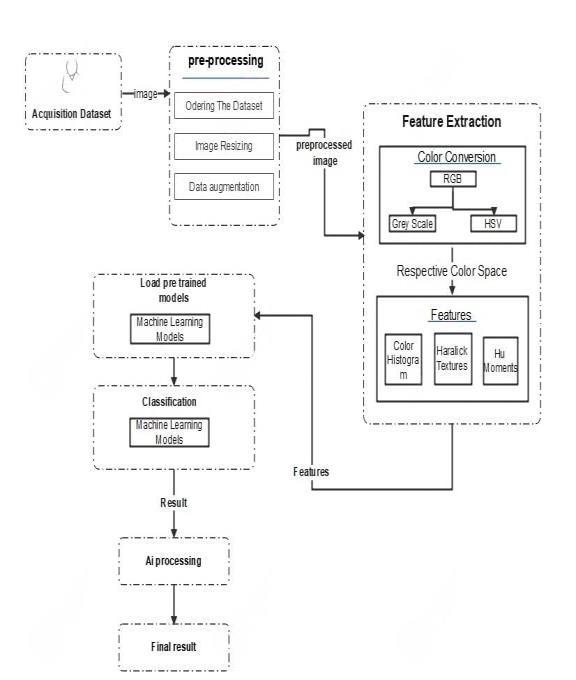
International Research Journal of Engineering and Technology (IRJET) e-ISSN:2395-0056
Volume: 11 Issue: 05 | May 2024 www.irjet.net p-ISSN:2395-0072


International Research Journal of Engineering and Technology (IRJET) e-ISSN:2395-0056
Volume: 11 Issue: 05 | May 2024 www.irjet.net p-ISSN:2395-0072
Indrajith K1 , Livia Christopher2 , Kuriakose Baby3 , V Ranjanapriya4
1,2,3,4
Abstract Skincancerisaprevalentandpotentiallylifethreatening condition that necessitates early detection and personalized interventions for effective treatment. This project presents a comprehensive approach to address this issue by combining machine learning (ML) andartificialintelligence(AI)techniquesforskincancer type classification and nutritional diet recommendation This project combines machine learning (ML) and artificial intelligence (AI) to address skin cancer diagnosis and management. The ML model accurately classifies skin cancer types using deep learning on diverse lesion images. Additionally, an AI-based nutritionalrecommendersystemtailorsdietplansbased on cancer type, health history, and preferences. The integratedsolutionaimstoimprovepatientoutcomesby enabling early detection, precise classification, and personalized nutritional support, presenting a valuable tool for healthcare professionals and patients alike. Clinical trials and user feedback validate the system's effectivenessinreal-worldhealthcarescenarios.
Index Terms Skin cancer, Artificial intelligence, MachineLearning,Healthcare
Skin cancer remains a significant public health concern globally, necessitating innovative approaches for early detectionandpersonalizedcare.Thisprojectintroduces a novel paradigm in skin cancer diagnosis and management by harnessing the power of machine learning (ML) and artificial intelligence (AI). The integration of sophisticated image analysis techniques for precise skin cancer type classification and an AIdriven nutritional recommendation system forms the cornerstone of our endeavor, offering a comprehensive solutiontoaddressthecomplexitiesofskincancer.
The diversity in skin cancer types, including melanoma, squamous cell carcinoma, and basal cell carcinoma, underscores the need for accurate and efficient diagnostictools.Conventionalmethodsoftenfallshortin providing personalized insights into cancer types, leading to generalized treatment approaches. Our ML model,leveragingdeeplearningalgorithms,strivestofill
this gap by scrutinizing a diverse array of skin lesion images. This approach ensures a reliable and precise classificationsystemthataidshealthcareprofessionalsin tailoringtreatmentplanstothespecificskincancertype, therebyenhancingtheoverallefficacyofinterventions.
Beyond the realm of diagnostics, our project acknowledgesthepivotalroleofnutritioninsupporting skin health and mitigating cancer risks. An AI-based nutritional recommendation system is designed to craft personalized diet plans, taking into account the individual'sskincancertype,healthhistory,anddietary preferences.Thisholisticapproachaimstonotonlytreat the disease but also promote overall well-being, acknowledging the interconnectedness of nutrition and health.
The amalgamation of ML, AI, and healthcare in this project signifies a paradigm shift towards personalized andtargetedinterventionsinthefieldofdermatology.As we embark on this journey, the effectiveness of our integrated solution will be rigorously validated through clinical trials and user feedback, ensuring its practical applicability in real-world healthcare settings. By contributing to the advancement of precision medicine forskincancer,ourprojectaspirestousherinanewera ofpatient-centriccareandimprovedoutcomes.

International Research Journal of Engineering and Technology (IRJET) e-ISSN:2395-0056
Volume: 11 Issue: 05 | May 2024 www.irjet.net p-ISSN:2395-0072
LITERATURE REVIEW
SI PAPER AUTHOR YEAR
1 Cancer Classification Using Gaussian Naive Bayes Algorithm Hajer Kamel; Dhahir Abdulah; Jamal M; AlTuwaijari
2019 The study was to assesstheeffectiveness of the Gaussian Naive Bayes algorithm in accurately classifying cancer types based on relevant features, contributing to the advancement of reliable and efficient cancer diagnostic methodologies
Methodolgy Findings
The study employs the Gaussian Naive Bayes algorithm on a dataset, utilizing statisticalfeaturesfor cancerclassification
The research demonstrates that the Gaussian Naive Bayes algorithm achieves accurate and efficient cancer classification, showcasingitspotentialasa robust tool in medical diagnostics
2 Skin Cancer Classification using Transfer Learning HariKishan Kondaveeti; Prabhat Edupuganti
2020 The paper aims to enhance skin cancer classification accuracy by employing transfer learning techniques, utilizing pre-trained convolutional neural networks (CNNs) on dermatoscopicimages
The study adopts transfer learning, utilizing pre-trained CNN models such as VGG16andResNet50, fine-tuningthemona dataset of dermatoscopic images to leverage the knowledge gained from unrelated image recognition tasks for improvedskincancer classification
The proposed transfer learning approach demonstrated superior performance in skin cancer classification, outperforming traditional CNN architectures, and establishing the effectiveness of leveraging pre-trained models for dermatoscopic image analysis.
3 Diet and Workout Recommend ation Using ML S. Sadhasivam ;M.S. Sarvesvara n;P Prasanth;L Latha
2023 It aims to develop a diet and workout recommendation system using machine learning (ML) techniques to provide personalized fitness plans
The study employs ML algorithms to analyze user data, including health metrics, preferences, and fitness goals, generating tailored diet and workout recommendations for individuals
The ML-based system demonstrates effectiveness in delivering personalized diet and workout plans, contributing to enhanced fitness outcomes and user satisfaction
4 CHARLIE: A Chatbot That Recommends Daily Fitness and Diet Plans Deepanjali Chowdhury ;Ahana Roy;Sreeniv asan Ramasamy Ramamurt hy;Nirmaly aRoy
2023 To develop and evaluate CHARLIE, a chatbot leveraging natural language processing and machine learning, to recommend personalized daily fitnessanddietplans.
Natural language processing techniques and machine learning algorithmstodevelop CHARLIE, integrating user input and preferences to dynamically generate personalized fitness and diet recommendations
CHARLIE demonstrated efficacy in providing personalized daily fitness and diet plans through natural language interactions, showcasing its potential as an interactive and user-friendly tool for promoting health and wellness

International Research Journal of Engineering and Technology (IRJET) e-ISSN:2395-0056
Volume: 11 Issue: 05 | May 2024 www.irjet.net p-ISSN:2395-0072
5 IntelliDoctor - AI based Medical Assistant Meera Gandhi;Vis hal Kumar Singh;Vivek Kumar
2019 Aims to develop and evaluate an intelligent medical assistant utilizing artificial intelligence to enhance diagnostic accuracy and healthcare decision-making.
The research employs a combination of machine learning algorithms and natural language processing techniquestodevelop the IntelliDoctor system, integrating medical knowledge databases and patient data for efficientandaccurate medicalassistance.
The study demonstrates that IntelliDoctor significantly improves diagnostic capabilities, providing valuable support to healthcare professionals and enhancing patient outcomes through its intelligent decision-making capabilities.
6 Cancer Detection and Analysis Using Machine Learning
Abhishek Verma;Cabi net Kumar Shah;Veerp al Kaur;Senat e Shah;Prash ant Kumar
2019 The paper aims to employ machine learning for cancer detectionandanalysis.
The study utilizes a dataset of medical images, applies machine learning algorithms for feature extraction, and employs classification models to detect and analyze cancerpatterns.
The findings of the paper showed that the proposed approach achieved high accuracy in diagnosing osteoarthritis from knee xray images. This suggests that transfer learning and smart feature engineering can be effective in improving the accuracy of osteoarthritisdiagnosis
7 Detection of Skin Cancer using Artificial Intelligence & Machine Learning Concepts
V.K. Suhasini;Pr erana B. Patil;K.N. Vijaykumar ;S.C. Manjunath a;T. Sudha;P. Kumar;Gop alaiah Ramachand raiah;G. Pavithra;T. C. Manjunath
2022 To develop and evaluate a skin cancer detection system leveraging Artificial Intelligence and Machine Learning concepts.
The authors employedadatasetof skin images, implemented a deep learning model, and utilized various machine learning algorithms to train and validate the system for accurate skincancerdetection.
The study demonstrated promising results, indicating the effectiveness of the proposed AI and MLbasedapproachindetecting skin cancer, with high accuracy and potential for enhancingearlydiagnosis.

International Research Journal of Engineering and Technology (IRJET) e-ISSN:2395-0056
Volume: 11 Issue: 05 | May 2024 www.irjet.net p-ISSN:2395-0072
8 Systematic Literature Review on Application of Artificial Intelligence in Cancer Detection Using Image Processing
Giovanni Chandra;Ke vina Diva Irisha;Vivia nit Indyca Vica;Puti Andam Suri;Muha mmad Edo Syahputra
2022 To systematically review existing literature to comprehensively analyze the application of artificial intelligence in cancer detection through image processing.
Thereviewemploysa rigorous methodology, including systematic search strategies, inclusion/exclusion criteria, and quality assessment, to synthesize and critically evaluate studies on AI-based image processing in cancerdetection.
Thereviewrevealssignificant advancements in the utilization of artificial intelligence,particularlydeep learning techniques, showcasing improved accuracy and efficiency in cancer detection through various image processing modalities, with a focus on enhancing diagnostic capabilities and potential for earlyintervention.
9 Application of Machine Learning Algorithms in Medical Image Analysis: A case study for Breast Cancer detection
Aashi Tripathi;Sh amama Anwar
2023 The main objective of thispaperistopropose a novel explainable method for knee OA diagnosis based on radiographs and Magnetic Resonance Imaging (MRI), which is called DeepKnee Explainer
Neural Network(DNNs), DenseNet
DNN-based analytic pipelines towards an increasing acceptance and adoption of AIassisted applications in the clinical practice for improved knee OAdiagnoses
10 Detection of Skin Cancer using Artificial Intelligence & Machine Learning Concepts
V.K. Suhasini;Pr erana B. Patil;K.N. Vijaykumar ;S.C. Manjunath a;T. Sudha;P. Kumar;Gop alaiah Ramachand raiah;G. Pavithra;T. C. Manjunath
2022 To develop and evaluate a skin cancer detection system utilizing artificial intelligence and machine learning concepts.
The study employs a dataset of skin images, implements deep learning algorithms, and evaluatesthemodel's performance through metrics such as sensitivity, specificity, andaccuracy.
The proposed skin cancer detection system demonstrates promising results, achieving high accuracy and sensitivity, thereby showcasing the effectiveness of artificial intelligence and machine learning in early detection ofskincancer.

International Research Journal of Engineering and Technology (IRJET) e-ISSN:2395-0056
Volume: 11 Issue: 05 | May 2024 www.irjet.net p-ISSN:2395-0072
Inexploringexistingmodelsthroughaliteraturereview, it becomes evident that prevailing approaches often revolve around the development of separate models for distincthealthcarecomponents,specificallyintherealms of skin cancer classification and nutritional diet recommendation. The conventional trajectory of research in health informatics has predominantly emphasized specialized models designed to excel in eitherdiagnostictasksordietaryguidance,withminimal integrationbetweenthesefacets.
Numerous studies have contributed significantly to the field by focusing on the advancement of skin cancer classification models. Leveraging artificial intelligence and machine learning methodologies, researchers have aimed to enhance the accuracy and efficiency of diagnostic processes, offering valuable insights into diseaseidentificationandcategorization.Simultaneously, a parallel avenue of research has emerged, focusing on the development of models geared towards providing personalized nutritional diet recommendations. These models often leverage data-driven approaches to tailor dietary advice based on individual health parameters, creating a niche within the broader spectrum of health informatics.
In our proposed model, we envisage a transformative fusionofartificialintelligence(AI)andmachinelearning (ML) techniques, creating a unified framework that simultaneously addresses skin cancer classification and nutritional diet recommendation. Recognizing a notable void in the current landscape, where existing models tend to specialize in either diagnosis or lifestyle guidance, our approach seeks to bridge this gap by offering an integrated solution. At its core, the model harnessesthecapabilitiesofadvancedAIalgorithmsfor skin cancer classification, leveraging deep learning and pattern recognition to enhance diagnostic accuracy. By seamlesslyintegratingthesediagnosticcapabilitieswith ML-drivennutritionaldietrecommendationsystems,the model aspires to provide a holistic understanding of patienthealth,acknowledgingtheinterconnectednature ofskincancermanagementandoverallwell-being.
This envisioned model holds the promise of reshaping the future of healthcare informatics. By marrying the powerofAIandML,themodelnotonlystreamlinesthe diagnosticprocessforskincancerbutalsoofferstailored nutritional guidance, recognizing the significance of
lifestylefactorsinpatientcare.Thisintegratedapproach anticipates a paradigm shift in healthcare, where personalized,patient-centricsolutionsbecomethenorm. As we look ahead, our proposed model stands as a beaconforafuturewhereAIandMLconvergetoprovide comprehensive, efficient, and forward-thinking healthcare solutions that consider both the diagnostic andlifestyleaspectsofpatienthealth.

The functioning of our proposed model involves a seamless integration of image processing, machine learning(ML),andartificialintelligence(AI)toprovidea comprehensivesolutionforskincancerclassificationand personalized nutritional diet recommendation. The workflow begins with the input of skin images, which undergo image processing to extract relevant features andcharacteristics.Theseprocessedimagesarethenfed intotheMLcomponentofthemodel,whichistrainedon adiversedatasetofskincancerimages.
The ML algorithm employs deep learning and pattern recognition techniques to classify the skin images into different types of skin cancer. This classification step is crucialforprovidinganaccuratediagnosis,allowingthe modeltodeterminethespecificskincancertypepresent in the input images. Once the skin cancer type is identified, the model seamlessly transitions to the AI component, which is responsible for recommending a tailored nutritional diet based on the diagnosed skin cancertype.
The AI-driven nutritional recommendation system analyzes the individual's health profile, the specific

International Research Journal of Engineering and Technology (IRJET) e-ISSN:2395-0056
Volume: 11 Issue: 05 | May 2024 www.irjet.net p-ISSN:2395-0072
characteristicsofthediagnosedskincancer,andpossibly other relevant health factors. This information is then used to generate personalized dietary advice aimed at supporting the patient's overall health and addressing the unique nutritional needs associated with the identified skin cancer type. By integrating ML for classification and AI for dietary recommendation, our model not only enhances diagnostic accuracy but also provides a holistic approach to patient care, combining both medical and lifestyle considerations for a more comprehensivehealthcaresolution.
Development Environment Setup: The development environment has been set up with all the necessary libraries and frameworks including Python, Flask, TensorFlow,Keras,OpenCV,andSQLite.
Frontend Interface Design: The frontend interface has been designed and implemented using HTML, CSS, and JavaScript.Userscanuploadskincancerimagesthrough thisinterface.
Backend API Endpoints Development: Backend API endpoints have been developed using Flask framework tohandleimageprocessingandclassificationtasks.
Image Processing and Feature Extraction: Image processing and feature extraction tasks have been successfullyimplementedusing OpenCV.This allowsfor extracting relevant features from the uploaded skin cancerimages.
Machine Learning Model Training: Machine learning models, specifically Convolutional Neural Networks (CNNs), have been trained using TensorFlow and Keras onskincancerimagedatasets.Thesemodelsaretrained to classify different types of skin cancer based on the extractedfeatures.
Integrationof Trained Models: Thetrained CNN models have been integrated into the Flask backend to enable classificationofuploadedskincancerimages.
Nutritional Diet Recommendation Logic: A logic for nutritionaldietrecommendationsbasedontheclassified skin cancer type has been implemented. This logic fetchespre-defineddietrecommendationsfromaSQLite database.
SQLite Database Setup: A SQLite database has been set up to store pre-defined diet recommendations for different skin cancer types. This allows for efficient
retrieval of diet recommendations based on the classificationresults.
ImageUploadInterface:
The frontend interface allows users to upload skin cancer images easily. Users can simply select the image filefromtheirdeviceanduploadittothesystem.
ImageProcessingandClassification:
Upon image upload, the backend processes the image using machine learning and artificial intelligence techniques.
NutritionalDietRecommendation:
Based on the classified skin cancer type, the system provides nutritional diet recommendations to support holisticpatientcare.
SampleScreenshots:


INTERFACE: Fig1.1LandingPage Fig1.2LoginPage

International Research Journal of Engineering and Technology (IRJET) e-ISSN:2395-0056
Volume: 11 Issue: 05 | May 2024 www.irjet.net p-ISSN:2395-0072

comprehensive review reveals that conventional approaches often emphasize standalone models for either skin cancer classification or nutritional diet recommendation.Incontrast,ourinnovativeframework representsapioneeringefforttoamalgamateboththese critical aspects within a single, unified model. This departure from traditional paradigms not only streamlines the diagnostic and treatment process but also positions our work at the forefront of a paradigm shiftinthefieldofhealthcareinformatics.
The integration of artificial intelligence and machine learning functionalities not only enhances the accuracy of skin cancer type classification but also introduces a novel dimension by seamlessly incorporating personalized nutritional diet recommendations. This holistic approach not only addresses the immediate concerns related to skin cancer diagnosis and entbut alsoestablishesa foundationfor more centric, proactive healthcare strategies. As we envision the future, ourproject sets a precedent forthe evolution of integrated models that cater to diverse healthcare needs, promising a more efficient, cohesive, -focused approach to skin cancer detection andmanagement.

Fig2.1Result1
[1] Cancer Classification Using Gaussian Naive Bayes Algorithm Hajer Kamel; Dhahir Abdulah; Jamal M. Al-Tuwaijari2019

Fig2.2Result2
Here we focus on "Skin Cancer Type Classification and NutritionalDietRecommendationusingAI&ML,"stands out in the landscape of existing literature. A
[2] IntelliDoctor - AI based Medical Assistant Meera Gandhi;VishalKumarSingh;VivekKumar2019 Skin Cancer Classification using Transfer Learning HariKishanKondaveeti;PrabhatEdupuganti2020 Cancer Detection and Analysis Using Machine Learning Abhishek Verma;Cabinet Kumar Shah;Veerpal Kaur;SenateShah;PrashantKumar2022 DetectionofSkinCancerusingArtificialIntelligence & Machine Learning Concepts V.K. Suhasini;Prerana B. Patil;K.N. Vijaykumar;S.C. Manjunatha;T. Sudha;P. Kumar;Gopalaiah Ramachandraiah;G. Pavithra;T.C. Manjunath 2022
[6] Systematic Literature Review on Application of Artificial Intelligence in Cancer Detection Using Image Processing GiovanniChandra;KevinaDivaIrisha;VivianitIndyca Vica;Puti Andam Suri;Muhammad Edo Syahputra 2022

International Research Journal of Engineering and Technology (IRJET) e-ISSN:2395-0056
[7] Application of Machine Learning Algorithms in Medical Image Analysis: A case study for Breast Cancer detection AashiTripathi;ShamamaAnwar2023.
[8] DetectionofSkinCancerusingArtificialIntelligence & Machine Learning Concepts
V.K. Suhasini;Prerana B. Patil;K.N. Vijaykumar;S.C. Manjunatha;T. Sudha;P. Kumar;Gopalaiah Ramachandraiah;G. Pavithra;T.C. Manjunath 2022
[9] Diet and Workout Recommendation Using ML S. Sadhasivam;M.S. Sarvesvaran;P. Prasanth;L. Latha 2023
[10] CHARLIE: A Chatbot That Recommends Daily FitnessandDietPlansDeepanjaliChowdhury;Ahana Roy;Sreenivasan Ramasamy Ramamurthy;Nirmalya Roy2023
Volume: 11 Issue: 05 | May 2024 www.irjet.net p-ISSN:2395-0072 © 2024, IRJET | Impact Factor value: 8.226 | ISO 9001:2008 Certified